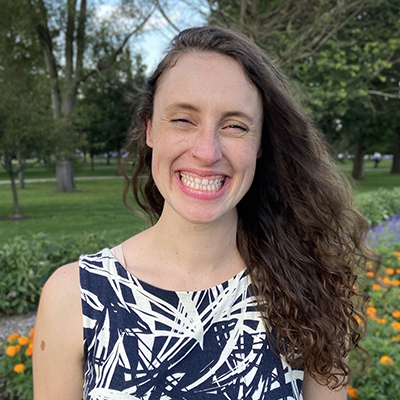February 3-7, 2024
Boston Convention and Exhibition Center
Boston, MA, USA


February 3-7, 2024
Boston Convention and Exhibition Center
Boston, MA, USA
This year’s scientific program will bring you more than 150 scientific talks spanning nine educational tracks within life sciences, technology and laboratory automation. Sessions will build off of the innovative, life-changing and sometimes surprising discoveries from over the last year.
We’re excited to bring the in-person exchange of research and ideas back to Boston, February 3-7. Watch this section for complete details on 2024 keynote speakers, educational tracks, the scientific podium program and short course information.
Special thanks to the SLAS2024 Program Chairs: Melissa Crisp (Eli Lilly) and Kamlesh (Ken) Patel (Sandia National Laboratories at Purdue University)



Podium presentations at SLAS2024 are organized into nine educational tracks. Track and session titles and descriptions and names of track chairs and session chairs follow below.
The Scientific Program Committee selects speakers based on the innovation, relevance and applicability of research. If your proposed topic does not squarely fit into the focus of one of these tracks, please submit it for committee consideration regardless. The committee members use their judgment and experience to select presentations that best address the interests and priorities of today’s life sciences discovery and technology community.
The Editors of SLAS Discovery and SLAS Technology have hand-selected a list of pre-reads to give SLAS2024 attendees a glimpse of the research represented within each educational track of this year's program.
Track Chairs: Vasudev Kantae, Ph.D., Astrazeneca and Idlir Liko, Ph.D., OMass Therapeutics
The qualitative and quantitative characterization of endogenous and exogenous analytes in biological systems are the basis of drug discovery and development. This track will highlight important developments in bioanalytical technologies, including advances in label free technologies, applications of target and mechanism deconvolution techniques and omics approaches to biomarker analysis.
Track Chairs: David Brierley, Ph.D., GlaxoSmithKline and Jennifer Smith, Ph.D., Harvard University
This track will focus on recent innovations across the assay development and screening discipline, including the adoption of novel technologies and the implementation of effective, innovative screening campaigns and hit triage strategies. Attendees will learn about the development of robust, physiologically relevant biochemical, biophysical and cellular assays that are crucial for identifying novel targets and active ligands that engage their targets directly. There will be an emphasis on recent case studies where cutting-edge assay approaches have increased the success rates of screening for target discovery and lead identification campaigns. Additional attention will be paid to emerging screening efforts that have been coupled with next-generation therapeutic modalities and novel mechanisms of action to broaden the scope of target classes that can be drugged. Taken together, the overall track will highlight advances in the fields of assay development and screening that enhance efforts to identify, validate and characterize novel targets and potential leads molecules.
Track Chairs: Daniel Sipes, M.S., Plexium and Paul Anderson, M.S., Neurocrine
This track focuses on the innovative use of biological or chemistry applications, tools, technologies and techniques as they pertain to automated high-throughput screening, the advancement of laboratory processes or improvement of the quality and impact of experimental laboratory data. Emphasis is placed on advancements in chemically and biologically relevant technologies using engineering, analytical, informatics, and application to cutting edge automation-assisted research.
Track Chairs: Marc Ferrer, Ph.D., NCATS/NIH and Madhu Nag, Ph.D., Insphero
Attendees will learn from industry and academic leaders about new cellular technologies and their application in the understanding of normal physiology and disease, and in the generation of disease-relevant models for drug discovery and pre-clinical development. The track will cover models used for illuminating functional genomics and for pharmacology, ADME or toxicity outcomes. The technologies covered will include the generation and use of patient-derived models, iPSC models, complex co-cultures, organoids, organ-on-chips, and microphysiologic models. The track will also include cellular therapeutics and cell technologies to support biologics and gene therapy approaches.
Track Chairs: Mike Tarselli, PhD., Tetra Science and Eric Ma, Ph.D., Moderna
Data science and AI have become common topics in life sciences at an exponential rate. A decade ago, companies were infrequently knowledgeable about the applications for these technologies, whereas today we see large organizations focusing on data digitization strategies, small organizations with hugely aspirational computational goals, and even some drug discovery companies launching with a computational science platform as their primary differentiator. The conversation has decidedly shifted from "what if" to "when", and the competition is fierce - both to set your organization apart and to get the right expertise to wield the technology. This track will focus on how data science helps organize and make sense of life science data, and in return, how companies and groups can best support data science teams through literacy goals and pipelines for growth and hiring. Emphasis will be placed on stories from groups that leverage data science and AI in new and novel ways to both show successes and lessons for others to learn from, and to bring up new moonshot ideas that help our field continue to grow and nurture itself.
Track Chairs: Eileen Seo, Ph.D., Arizona State University and Julea Vlassakis, Ph.D., Rice University
Micro- and nano-technologies have leveraged their unique physics and their ability to interact with biological systems at matched length scales to advance novel insights into human health. With micro- and nanotechnologies now being scaled via automation, integrated with optical systems and assembled into structured materials, their impact to biological research and medical science is now larger than ever. This track will highlight recent advances in multi-omic, high-content platforms that enable insights at subcellular lengthscales and in the fabrication and application of novel micro- and nanomaterials.
Track Chairs: Vladislav Zarayskiy, PhD., Monte Rosa Therapeutics and Anastasia Velentza, Ph.D., Plexium
Our disease understanding has revealed targets that are challenging to treat with typical inhibitor approaches. The next generation of therapeutics needs novel drug-target strategies that transcend transcend traditional chemical space. This track will provide drug discovery scientists with the latest information on protein degraders and stablizers, nucleic acid-targeting molecules, nucleic acid therapeutics and other emerging modalities.
Track Chairs: Meiye Wu, Ph.D., 10x Genomics and Joe De Rutte, Ph.D., Partillion
Omics technologies have become an integral part of science and medicine, from cutting edge discovery of biomarkers to a personalized approach to health and wellness including early detection and treatment of cancer. In this session we explore four main avenues where omics approaches have revolutionized cancer research, personal health and wellness, single cell and spatial technologies and drug discovery and therapy.
Track Chairs: Dan Meyer, MBA, CellChorus and Bruce Zetter, Ph.D., Harvard University
The Precision Medicine & Diagnostics track focuses on approaches that aim to provide translatable insight into disease biology. This includes cellular, molecular, biochemical, engineering and bioinformatic strategies in diagnostics, screening and translational medicine. The session will emphasize the application of state-of-the-art, quantitative, high-throughput and high-resolution approaches to both cellular models and complex tissues. These strategies enable multiparametric computational analyses to reveal the complex interplay of genetics, cell types and drugs to advance precision medicine. Topics include improvements in stem cell-based disease modelling, bioengineering, molecular and cellular assays, bioinformatic and imaging approaches.
The SLAS2024 Short Course Program provides in-depth instruction on topics, issues and techniques related to the laboratory science and technology community. This year's short courses are listed below. Short Courses will be presented on Saturday, February 3 and Sunday, February 4, 2024.
View 2024 Short Course Descriptions and Pricing Details
Contact Hannah Rosen, SLAS Scientific Manager.